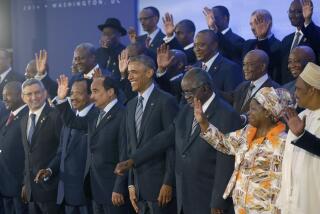Baker to Seek Support of 3 Key African Nations
- Share via
WASHINGTON — Secretary of State James A. Baker III will meet this weekend with foreign ministers of three African members of the U.N. Security Council to see if they would support a resolution authorizing military action against Iraq, U.S. officials said Wednesday.
The votes of the three nations--Ethiopia, Zaire and Ivory Coast--will be crucial if the Bush Administration decides to go ahead with plans to seek standby authority to take offensive action against Iraq should peaceful means fail to end the occupation of Kuwait. By enlisting their support, the United States would gain broader approval among neutral and Third World nations for its gulf stance.
Baker already has discussed the issue with leaders of the other permanent members of the Security Council--the Soviet Union, Britain, France and China--as well as with Canada, one of 10 rotating members. The permanent members could have killed the resolution with their veto power.
In addition to his sessions with representatives of the three African countries, Baker is expected to meet with officials of two other temporary Security Council members--Finland and Romania--during the European summit meeting next week in Paris.
Although the U.S. government, supported by Britain, maintains that it has ample authority to attack Iraq under the “collective self-defense” provisions of the U.N. Charter, specific Security Council authorization would provide a firmer political base.
The Soviet Union, France, Canada, Turkey and a number of other nations whose support is vital to any military action have said that they oppose the use of force unless it is authorized in advance by the Security Council. Baker told an interviewer last week in Moscow that Security Council authorization “would be preferable from the standpoint of preserving as much of this unprecedented consensus that supports what’s being done in the gulf as possible.”
“Most countries believe that would be preferable,” he said.
U.S. officials have made it clear, however, that the Administration will seek a Security Council vote only if passage is assured. Baker’s current round of consultations is intended to test the waters for such a measure.
The United States would like to bring the measure to a vote this month while it still holds the council presidency under the U.N. rotation system. On Dec. 1, the presidency moves to Yemen, an Arab nation that has been lukewarm, at best, to the possible use of force against Iraq. Although the nation holding the presidency cannot thwart the will of the majority, it can create procedural hurdles to make action more difficult.
Since Iraq’s Aug. 2 invasion of Kuwait, the Security Council has approved 10 resolutions condemning Baghdad’s aggression. Many of them were passed unanimously, and all had at least 13 of the council’s 15 votes. Only Cuba and Yemen did not support all the measures. A resolution authorizing offensive military action would be far more controversial, however.
Baker leaves today for Brussels, where he will meet with officials of the 12-nation European Community. U.S. officials said that he will urge the community to increase its financial support for Turkey, Egypt and the emerging democracies of Eastern Europe, all of which have been hard hit by the crisis and the soaring price of oil.
Although the location of Baker’s meetings with the African diplomats has not been disclosed, it is believed to be Geneva. Baker then will join President Bush in Paris on Sunday for the summit meeting of the 34-nation Conference on Security and Cooperation in Europe.
More to Read
Sign up for Essential California
The most important California stories and recommendations in your inbox every morning.
You may occasionally receive promotional content from the Los Angeles Times.












